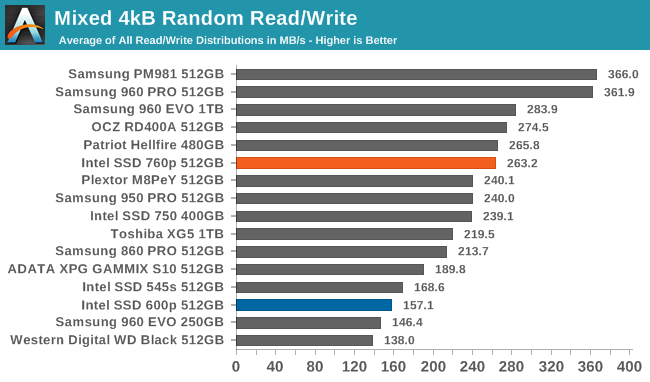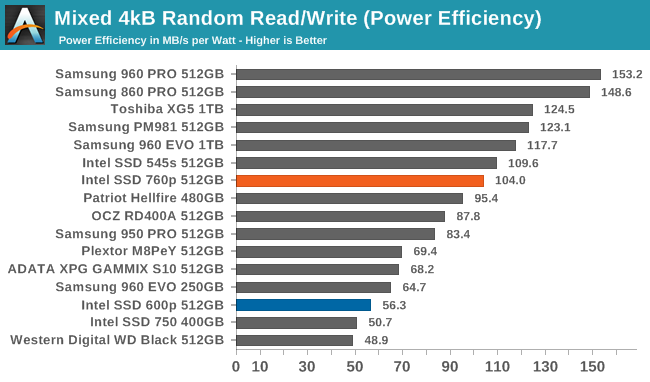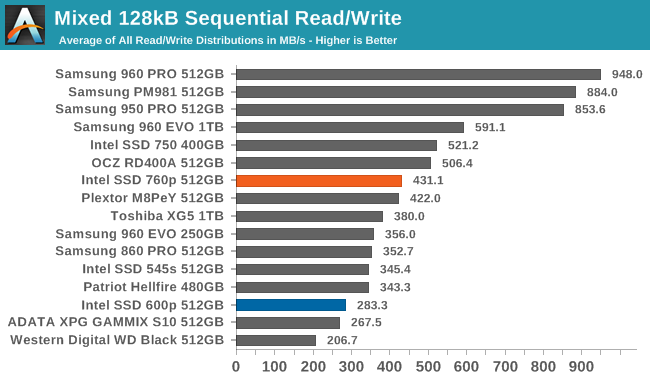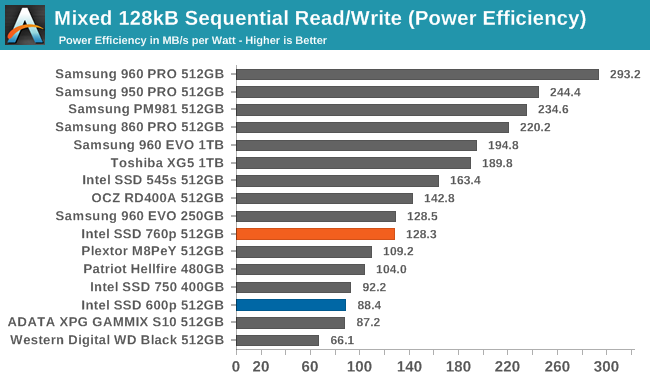Mixed Read/Write Performance |
您所在的位置:网站首页 › 固态硬盘760p › Mixed Read/Write Performance |
Mixed Read/Write Performance
|
Mixed Random Performance
Our test of mixed random reads and writes covers mixes varying from pure reads to pure writes at 10% increments. Each mix is tested for up to 1 minute or 32GB of data transferred. The test is conducted with a queue depth of 4, and is limited to a 64GB span of the drive. In between each mix, the drive is given idle time of up to one minute so that the overall duty cycle is 50%.
The overall performance of the Intel SSD 760p on the mixed random I/O performance is quite high for a TLC-based drive. Samsung's PM981 is much better, but the 512GB 760p is almost as fast as the 1TB Samsung 960 EVO. The 760p is clearly a viable competitor to the non-Samsung drives that use MLC NAND flash.
The Intel SSD 760p does not score quite as well for power efficiency as it does for raw performance on the mixed random I/O test, but it is still above average and far better than previous Intel SSDs. 
The random I/O performance of the Intel SDD 760p increases gradually but steadily as the proportion of writes increases. It's a good sign that there are no dips in performance along the way, but the performance on the final phase of the test with a pure random write workload is not competitive with the high-end SSDs. Mixed Sequential PerformanceOur test of mixed sequential reads and writes differs from the mixed random I/O test by performing 128kB sequential accesses rather than 4kB accesses at random locations, and the sequential test is conducted at queue depth 1. The range of mixes tested is the same, and the timing and limits on data transfers are also the same as above.
The average performance of the Intel SSD 760p on the mixed sequential workload test does not exceed the limits of a SATA link, but it does clearly beat the best speed achieved by a SATA drive on this test. Previous budget NVMe SSDs have failed to even match the fastest SATA SSDs due to the use of slow TLC NAND.
The power efficiency of the Intel SSD 760p on the mixed sequential I/O test is not great. It only beats drives that were notably slow (600p, WD Black) or unusually power-hungry (Intel 750, Plextor M8PeY). Samsung and Toshiba have set a much higher standard. 
The Intel SSD 760p performs much worse during the first half of this test, when the workloads are more read-heavy. By contrast, Samsung's NVMe SSDs tend to be at their worst during the second half of the test. The Samsung drives are much faster at either end of the test when the workload is either pure reads or pure writes, and this helps the Samsung drives secure a clear lead in performance. |
【本文地址】
今日新闻 |
推荐新闻 |



